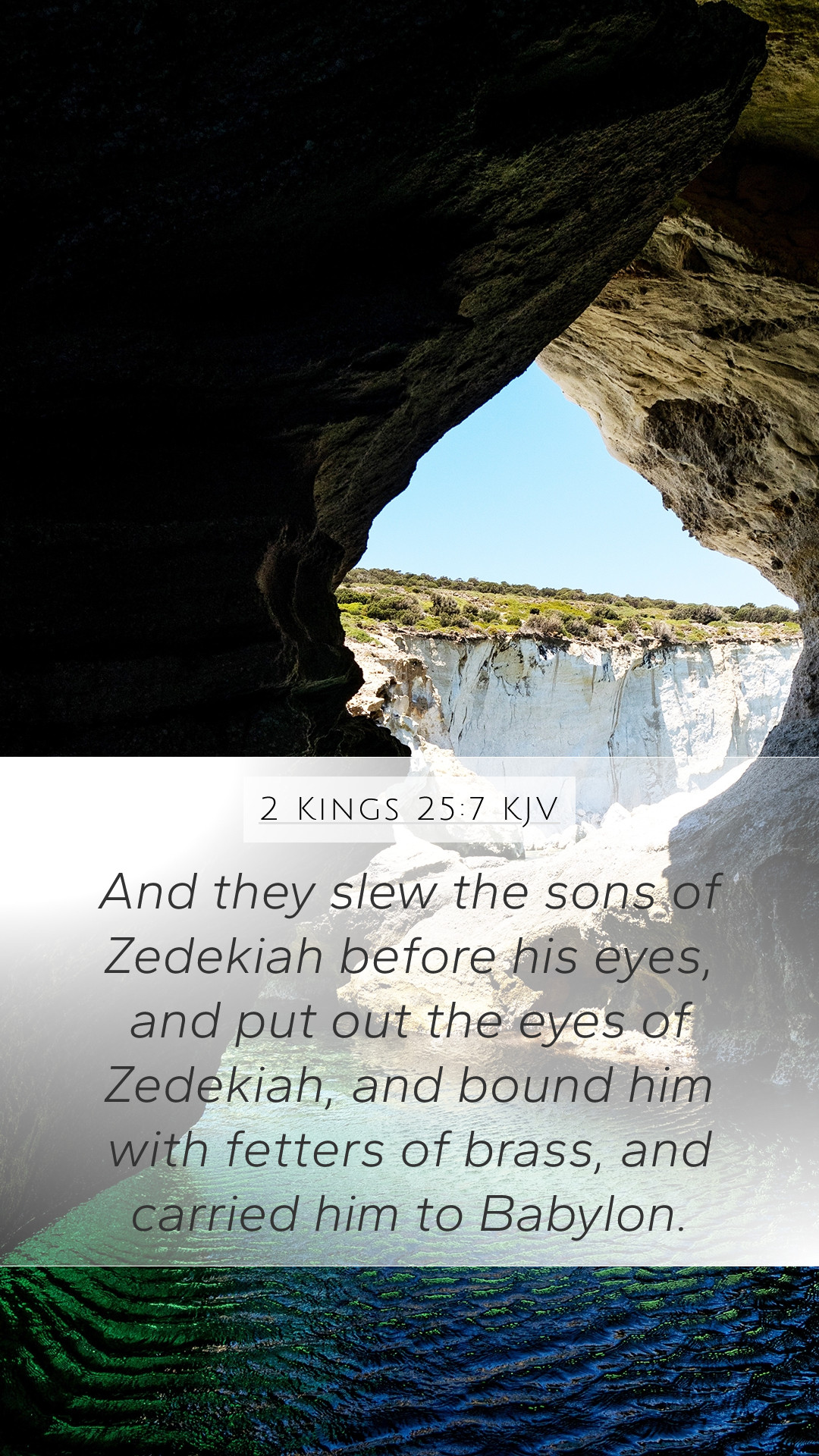Understanding 2 Kings 25:7 - A Comprehensive Commentary
Bible Verse: 2 Kings 25:7
“And they killed the sons of Zedekiah before his eyes; they put out the eyes of Zedekiah, and bound him with fetters, and carried him to Babylon.”
This verse provides a somber and tragic conclusion to the account of King Zedekiah and the fall of Jerusalem. It serves as a poignant reminder of the consequences of disobedience to God and the dire outcomes that ensue when a nation turns from righteousness.
Summary of Insights from Public Domain Commentaries
Various biblical commentaries shed light on the meaning and implications of this verse, offering deep insights into both its immediate context and broader theological implications.
-
Matthew Henry's Commentary:
Henry emphasizes that Zedekiah's fate reflects the judgment of God upon disobedience. The brutal act of killing his sons before his eyes serves to illustrate the depth of Zedekiah's suffering and the totality of his humiliation. This moment signifies not only personal tragedy for Zedekiah but also the fulfillment of prophecy regarding the demise of the kings of Judah.
-
Albert Barnes’, Notes on the Bible:
Barnes notes the historical context, reminding the reader that Zedekiah’s alliance with pagan nations and refusal to heed prophetic warnings resulted in his downfall. The brutal execution of his sons is seen as a method of inflicting maximum psychological anguish upon the king himself, thus serving God's justice in a visceral way. This act was not just a monarchy's end, but a divine pronouncement upon the nation’s rejection of God.
-
Adam Clarke’s Commentary:
Clarke reflects on the significance of sight and blindness in the biblical narrative. The loss of Zedekiah's sight symbolizes his spiritual blindness and failure to see the truth of God's word, even up to the point of defeat. Clarke also alludes to the cultural implications of being bound and taken to Babylon, highlighting the loss of dignity and autonomy, which serves as a metaphor for spiritual captivity.
Thematic Analysis
This verse encapsulates several critical themes captured in broader biblical teachings:
-
Judgment:
2 Kings 25:7 illustrates the direct consequences of rebellion against God. The violent end of Zedekiah signifies that turning away from divine instruction leads to destruction.
-
Tragedy:
The personal loss experienced by Zedekiah resonates with the broader tragedy of Judah’s fall. It emphasizes the heartache of lost potential when a people choose to forsake their covenant with God.
-
Prophetic Fulfillment:
This verse fulfills earlier prophecies regarding Zedekiah’s lineage and highlights the narrative continuity throughout the scriptures regarding God’s unwavering justice.
Practical Application and Reflection
For contemporary readers, 2 Kings 25:7 serves as a cautionary tale about leadership, accountability, and the importance of adhering to divine guidance. It poses significant questions for personal reflection:
- What are the consequences of turning away from God in modern times?
- How does understanding the historical context of Zedekiah’s reign influence our view of God’s justice?
- In what ways can we avoid the spiritual blindness that led to Zedekiah’s demise?
Cross References
This verse can be further understood by examining related scripture:
- Jeremiah 39:6-7: Offers a parallel account of Zedekiah's fate at the hands of the Babylonians.
- Ezekiel 12:13: Prophecy regarding Zedekiah’s end and the judgment upon Judah.
- 2 Kings 24:20: Provides context about the kingship of Zedekiah and the circumstances leading to the Babylonian captivity.
Conclusion
2 Kings 25:7 serves as a reminder of the severe consequences of disobedience and the tragic outcomes where God's prophecies are ignored. Through careful study and reflection, believers can gain valuable insights into the nature of God, leadership, and the importance of being attuned to divine guidance.


